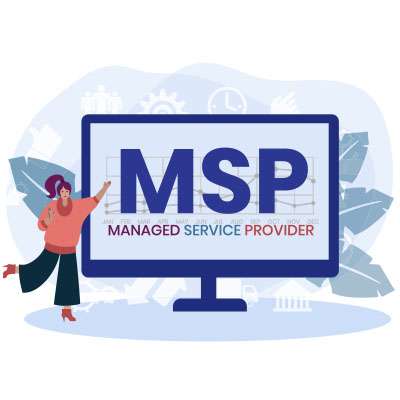Macro Systems Blog
Running a small or medium-sized business means juggling countless priorities. You're focused on your customers, team, and bottom line… but what about the technology that powers it all?
Usually overlooked, your IT infrastructure is far more than just the computers on desks. It's the complex web of network equipment, essential software subscriptions, cloud services, and even the personal smartphones and tablets your employees use for work. Keeping this entire ecosystem running smoothly and securely is a significant challenge for many SMBs.
It is great to have pride and confidence in your organization, especially in the team you’ve assembled… including your in-house technical support team. However, even the most capable IT team may not fully meet a business’ needs.
Listed below: an IT team's responsibilities and what can be done to correct any deficits they may encounter.
If I were to ask you what technology your business possessed and where it all was right now, could you give me an answer? If not, you’ve demonstrated the importance of keeping an accurate inventory of your business’ IT.
Listed below are some best practices to make managing your business’ IT inventory more effective.
Do you ever feel at home in your business’ server room? Assuming you have a server room, and it’s more than just a stuffy closet in an isolated part of your office, that is. If you’re not confident that you can provide your servers with the management, maintenance, and monitoring they require, we recommend you work with a managed IT company to ensure you get the most value you can from your server units.
The big thing in business computing is AI, or artificial intelligence, and businesses are implementing it to solve a lot of repetitive issues that free up their employees to serve other roles. One such area is for IT support. But is it worth it to chat with a robot when something as imperative as IT is on the line?
Computer problems can be very irritating, especially when they slow you down while working. Many times, it is something that can be fixed quickly, but then there are issues that an experienced IT professional has to address. Listed below are some of the most common computer problems professionals run into.
It’s natural for businesses to depend on their tools, like IT, to achieve success, but if you don’t take care of your systems, it could lead to downtime. You can bypass many of these challenges with the right approach to technology maintenance. Listed below are some of the proactive methods you can use to keep downtime to a minimum.
Managing servers can be a challenging task for small and medium-sized businesses (SMBs). Despite being essential to your operations, servers are complex technologies that, if not managed properly, can lead to wasted time, energy, and resources. Listed below are the vital functions of server management and how to maximize your current resources.
Most businesses rely on their technology; thus, a failure to manage that technology can lead to significant financial waste and operational inefficiencies. One significant way a business can waste money is through over-investment in unnecessary or overly complex IT infrastructure. Listed below is an examination on how companies waste their money on technology and how to identify if technology is working for your business.
There's a lot of pressure on (usually understaffed and overworked) internal IT teams to manage and maintain increasingly complex systems. For businesses noticing signs of strain on their IT staff, seeking assistance from managed services providers (MSPs) could be the remedy. Listed below are tips an MSP like us can use to alleviate the pressure and contribute to workplace wellness for all.
Do you have employees who struggle with their technology? Chances are that there will always be individuals who are not as proficient with it as you might expect, and without a dedicated IT resource to ask for assistance, they might get frustrated and disengage with their work. You need to provide the right support to your employees. Fortunately, Macro Systems has just the right solution to your problems: a help desk!
Cost/Benefit is a term you hear a lot. It’s always used in conversations about potential investment and means something. Well, at least it should. One of the places that many people can gain benefits from their investments is by outsourcing some of their responsibilities to an outside vendor. This works especially well with IT management. Listed below is a look at why outsourcing your technology support and management is a good investment.
It’s an unfortunate fact that all businesses will inherently face some type of threats during their operations; that’s inevitable. From cyberattacks to natural disasters to good, old-fashioned accidents, you’re liable to face no small risk. This risk makes a process known as risk mitigation so imperative for all businesses to undergo with some regularity.
Listed below are the aspects of creating and maintaining a dependable risk mitigation strategy.
This goes out to all the business owners, managers, department heads, and other leaders in the workplace who have to field user complaints and issues.
Being in this position can be difficult, because you often have to say no. No, we can’t change the timeline or increase the budget for this project. No, we can’t do XYZ that way because it would break compliance. No, we can’t get new hardware/software in until we get it approved in the budget. Repeat ad nauseam.
An organization’s IT strategy can define how it handles its entire operational strategy, which is why it is so critical to carefully consider your organizational approach to IT. Not only does it allow you to align your IT, and its support, to your business’ goals, but it also allows you to consider the circumstances that you operate under and find viable solutions to business problems. That’s not all. Listed below are some of the reasons that businesses should consider customizing their IT strategy to their business initiatives.
Many businesses, regardless of their size, are increasingly turning towards managed services to streamline their operations, limit expenses, and elevate their overall customer value proposition. The utilization of managed services has revolutionized the landscape, not just in terms of cost-saving, but also in facilitating businesses to grow and extract greater value from their IT infrastructure. Listed below is a look into how managed services achieve this dual objective.























